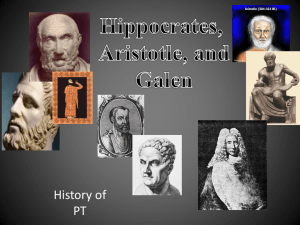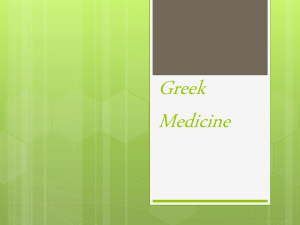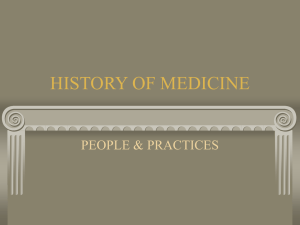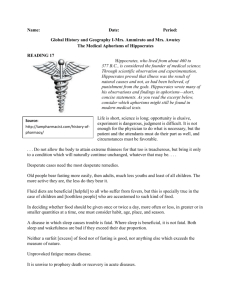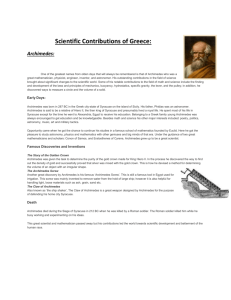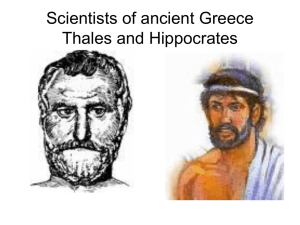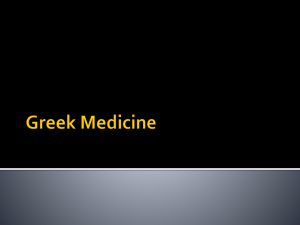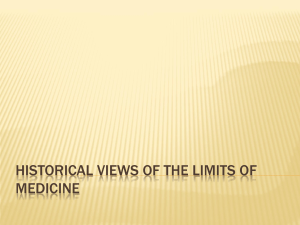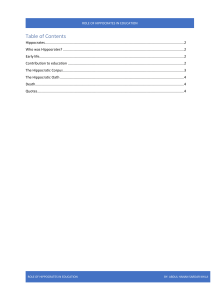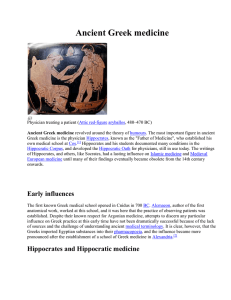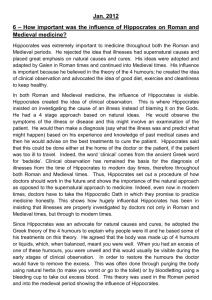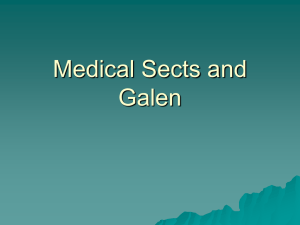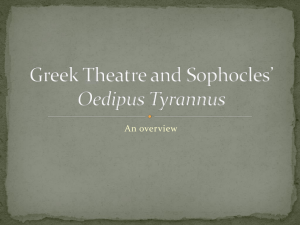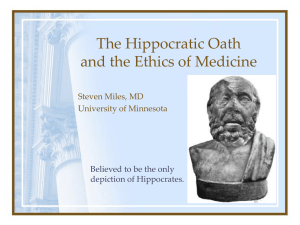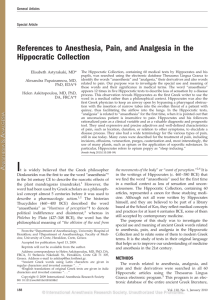File
advertisement
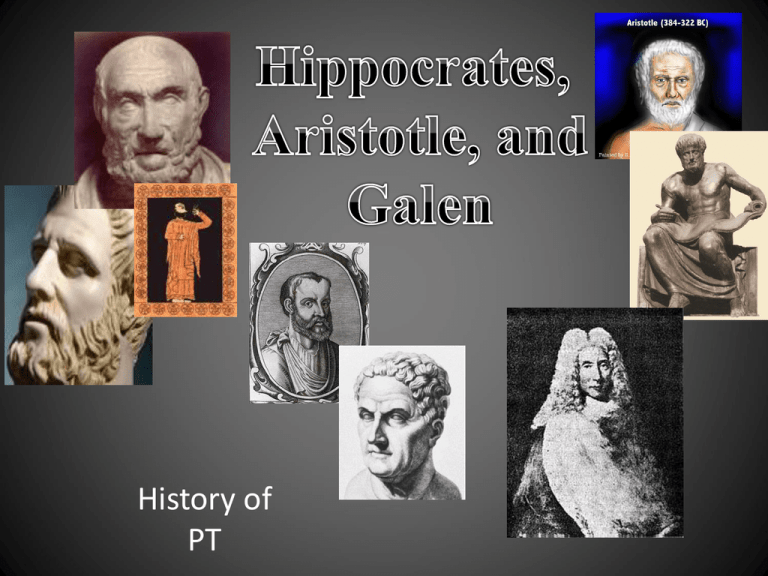
History of PT Early life • Hippocrates was born in 467 B.C. born on the island Cos, off the coast of Greece. • The ancient Greek physician Hippocrates is often called the “Father of Medicine.” • He proved that disease weren’t caused by gods or spirits it was caused by natural action. • He went to study medicine under his father in the form of apprenticeship. Following his father and doctor named Herodics, he was healing many. Of the many was the king Macedonia who had tuberculosis (a lung disease) and he helped him to recover. • His skills were put to the test fighting the plague for three years in Athens.. • Well remembered for his teaching of healing. He founded a school of medicine in Cos. The Hippocrates Corpus, a collection of roughly seventy books, is the oldest surviving medicine books. Hippocratic corpus • The Hippocratic Corpus, is a collection of over 60 works. Although all of them are attributed to Hippocrates, the Corpus is of a heterogeneous character, and many, if not most, of its works may actually have been written by his students • Still, most scholars are fairly certain the Hippocrates actually did author many books in the Corpus, including many original, groundbreaking works. • These works include: – Airs, Waters and Places – the first major work on medical meteorology, climatology, geography, and anthropology. – Aphorisms – a collection of wise, pithy sayings giving advice of practical matters of diet, prognosis, and therapeutics. – Ancient Medicine – a defense of the empirical study of medicine against on biased by preliminary assumptions. Hippocratic Medicine • • • • • Hippocrates' anatomical knowledge was rather scant, but this is compensated for by his profound insights into human physiology and the soundness of his reasoning. His surgical techniques for dislocations of the hip and jaw were unsurpassed until the nineteenth century. In therapeutics, Hippocrates saw the physician as the servant and facilitator of Nature. All medical treatment was aimed at enabling the natural resistance of the organism to prevail and overcome the disease, to bring about recovery. In the treatments he prescribed, Hippocrates was very sensible, pragmatic and flexible in his approach, favoring conservatism and moderation over radical or extreme measures. Bloodletting, which was much abused at other times in medicine's history, was used only rarely by Hippocrates, and even then, only applied conservatively. Hippocratic Medicine Cont. • • • • Hippocrates placed great emphasis on strengthening and building up the body's inherent resistance to disease. For this, he prescribed diet, gymnastics, exercise, massage, hydrotherapy and sea bathing. Hippocrates was a great believer in dietary measures in the treatment of disease. He prescribed a very slender, light diet during the crisis stage of an acute illness, and a liquid diet during the treatment of fevers and wounds. Hippocratic medicine was constitutionally based, so its approach to diagnosis and treatment was quite flexible. As a holistic healing system, Hippocratic medicine treated the patient, and not just the disease. Hippocrates was the first physician to systematically classify diseases based on points of similarity and contrast between them. He virtually originated the disciplines of etiology and pathology. By systematically classifying diseases, Hippocrates placed their diagnosis and treatment on a sounder footing. Contributions: • • • • His contributions to medicine include detailed observations of disease and its effects, and an understanding of how health is often influenced by external factors. He emphasized diet, exercise, and the clinical examination of biologic functions. He also used hydrotherapy and massage. He was the first physician in his time to recommend therapeutic exercises to his patients because he understood the principle of muscle, ligament, and bone atrophy (wasting) due to inactivity. He was the first to use electrical stimulation, applying torpedo fish wrappings for headaches. • Torpedo fish – has a charge of approx. • 80 volts to stun its prey Hippocratic Oath I swear by Apollo Physician and Asclepius and Hygieia and Panaceia and all the gods and goddesses, making them my witnesses, that I will fulfill according to my ability and judgment this oath and this covenant: To hold him who has taught me this art as equal to my parents and to live my life in partnership with him, and if he is in need of money to give him a share of mine, and to regard his offspring as equal to my brothers in male lineage and to teach them this art—if they desire to learn it—without fee and covenant; to give a share of precepts and oral instruction and all the other learning to my sons and to the sons of him who has instructed me and to pupils who have signed the covenant and have taken an oath according to the medical law, but no one else. I will apply dietetic measures for the benefit of the sick according to my ability and judgment; I will keep them from harm and injustice. I will neither give a deadly drug to anybody who asked for it, nor will I make a suggestion to this effect. Similarly I will not give to a woman an abortive remedy. In purity and holiness I will guard my life and my art. I will not use the knife, not even on sufferers from stone, but will withdraw in favor of such men as are engaged in this work. Whatever houses I may visit, I will come for the benefit of the sick, remaining free of all intentional injustice, of all mischief and in particular of sexual relations with both female and male persons, be they free or slaves. What I may see or hear in the course of the treatment or even outside of the treatment in regard to the life of men, which on no account one must spread abroad, I will keep to myself, holding such things shameful to be spoken about. If I fulfill this oath and do not violate it, may it be granted to me to enjoy life and art, being honored with fame among all men for all time to come; if I transgress it and swear falsely, may the opposite of all this be my lot. In your own words, translate the Hippocratic Oath into words that you think your classmates would be better able to understand but you can’t change the meaning. Modern Version I swear to fulfill, to the best of my ability and judgment, this covenant: I will respect the hard-won scientific gains of those physicians in whose steps I walk, and gladly share such knowledge as is mine with those who are to follow. I will apply, for the benefit of the sick, all measures [that] are required, avoiding those twin traps of overtreatment and therapeutic nihilism. I will remember that there is art to medicine as well as science, and that warmth, sympathy, and understanding may outweigh the surgeon's knife or the chemist's drug. I will not be ashamed to say "I know not," nor will I fail to call in my colleagues when the skills of another are needed for a patient's recovery. I will respect the privacy of my patients, for their problems are not disclosed to me that the world may know. Most especially must I tread with care in matters of life and death. If it is given me to save a life, all thanks. But it may also be within my power to take a life; this awesome responsibility must be faced with great humbleness and awareness of my own frailty. Above all, I must not play at God. I will remember that I do not treat a fever chart, a cancerous growth, but a sick human being, whose illness may affect the person's family and economic stability. My responsibility includes these related problems, if I am to care adequately for the sick. I will prevent disease whenever I can, for prevention is preferable to cure. I will remember that I remain a member of society, with special obligations to all my fellow human beings, those sound of mind and body as well as the infirm. If I do not violate this oath, may I enjoy life and art, respected while I live and remembered with affection thereafter. May I always act so as to preserve the finest traditions of my calling and may I long experience the joy of healing those who seek my help. Hippocrates Aristotle • Born 384 B.C. in Stageira in Macedonia. • His father was a physician and he probably received his training from his father. • He was trained in medicine and biology but he distinguished himself in Biology. • He is known as the “Father of Comparative Anatomy and Physiology,” and for the later theories of evolution and embryology. • He founded his own school of philosophy, the Lyceum, which was patterned after Plato’s Academy. Macedonia Plato The Lyceum Contributions: Aristotle's most important contribution to the theory of Greek Medicine was his doctrine of the Four Basic Qualities. • Hot • Cold • Wet • Dry The Four Basic Qualities are the foundations for all notations of balance and homeostasis in Greek Medicine. • Aristotle recommended rubbing massage using oil and water as a remedy for tiredness. • Around 180 B.C., the ancient Romans adopted a form of therapeutic exercises that they called gymnastics. Roman gladiators and athletes used gymnastics in the Roman arenas and in popular exhibitions of athletics. Galen • Born in 130 A.D. in Pergamum, or present day Turkey. • He was born into the lap of luxury, which enabled him to study. • His father was an architect so he sent Galen to the local Asclepion to be trained in medicine by the elder physician-priests. • His first post was as a physician and surgeon to the gladiators in Pergamum. An Asclepion was a healing temple, sacred to the god Asclepius. Usually found in the city center. Contributions: • Galen’s chief contributions to the theory of Greek Medicine were his theories of the three varieties of pneuma (air), or breath: 1) natural spirit resided in the liver, the center of nutrition and metabolism, 2) vital spirit was located in the heart, the center of blood flow regulation and body temperature, 3) animal spirit was created in the brain, the center of sensory perceptions and movement. • Galen, along with Hippocrates developed the Four Humors: 1) 2) 3) 4) Blood, or the Sanguine humor, is infused with the Attractive Virtue, or force. Yellow Bile, or the Choleric humor, is infused with the Digestive Virtue, or force. Black Bile, or the Melancholic humor, is infused with the Retentive Virtue, or force. Phlegm, or the Phlegmatic humor, is infused with the Expulsive Virtue, or force. • In pharmacology, Galen developed a system of Galenic degrees, which enabled physicians and pharmacists to gauge more precisely the effects of a medicinal substance. • He believed that moderate exercises strengthened the body, increased body temperature , allowed the pores of the skin to open, and improved a person’s spiritual well-being. Other Important Contributors: • Nicolas Andry – a professor at the Medical Facility in Paris, was the first scientist to relate the movements created by exercises to the muscular-skeletal system. • He is considered to be the “grandfather” of orthopedics. • He believed that exercises are able to cure many infirmities of the body. • He also postulated that fencing was one of the few exercises that contributed to the development of all muscles, especially the muscles of the arms and legs.
